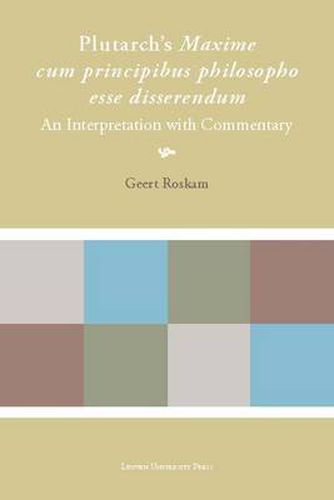Readings Newsletter
Become a Readings Member to make your shopping experience even easier.
Sign in or sign up for free!
You’re not far away from qualifying for FREE standard shipping within Australia
You’ve qualified for FREE standard shipping within Australia
The cart is loading…






The question of the political relevance of philosophy, and of the role which the philosopher should play in the government of his state, was often discussed in antiquity. Plato’s ideal of the philosopher-king is well-known, but his failure to realize his political ideal in Syracuse was perhaps the best argument against the philosopher’s political engagement. Nevertheless, Plato’s ideal remained attractive for later Greek thinkers. This is illustrated, for instance, by one of Plutarch’s short political works, in which he tries to demonstrate that the philosopher should especially associate with powerful rulers, because he can in this way exert the greatest positive influence on his society and at the same time maximize his personal pleasure. This study provides a thorough analysis of Plutarch’s Maxime cum principibus philosopho esse disserendum. Geert Roskam’s general introduction discusses each step in Plutarch’s argumentation in detail. A systematic lemmatic commentary then provides a systematic complement to the previous analysis of the work, dealing with many problems of textual criticism, explaining all kinds of realia, and discussing a great number of passages through parallels from Plutarch’s own oeuvre and from other authors.
$9.00 standard shipping within Australia
FREE standard shipping within Australia for orders over $100.00
Express & International shipping calculated at checkout
The question of the political relevance of philosophy, and of the role which the philosopher should play in the government of his state, was often discussed in antiquity. Plato’s ideal of the philosopher-king is well-known, but his failure to realize his political ideal in Syracuse was perhaps the best argument against the philosopher’s political engagement. Nevertheless, Plato’s ideal remained attractive for later Greek thinkers. This is illustrated, for instance, by one of Plutarch’s short political works, in which he tries to demonstrate that the philosopher should especially associate with powerful rulers, because he can in this way exert the greatest positive influence on his society and at the same time maximize his personal pleasure. This study provides a thorough analysis of Plutarch’s Maxime cum principibus philosopho esse disserendum. Geert Roskam’s general introduction discusses each step in Plutarch’s argumentation in detail. A systematic lemmatic commentary then provides a systematic complement to the previous analysis of the work, dealing with many problems of textual criticism, explaining all kinds of realia, and discussing a great number of passages through parallels from Plutarch’s own oeuvre and from other authors.